- Home
- STEVE MARTIN
Born Standing Up: A Comic's Life Page 2
Born Standing Up: A Comic's Life Read online
Page 2
I was five years old when television entered the Martin household. A plastic black box wired to a rooftop antenna sat in our living room, and on it appeared what had to be the world’s longest continuous showing of B Westerns. I had never seen anything with a plot, so even the corniest, most predictable stories were new to me, and I rode the Wild West by sitting astride a blanket I had placed on the back of an overstuffed chair and galloped along with the posse. I provided hoof noises by slapping my hands alternately on my thighs and the chair, which made enough variation in the sound effect to give it a bit of authenticity.
TV!
The TV also brought into my life two appealing characters named Laurel and Hardy, whom I found clever and gentle, in contrast to the Three Stooges, who were blatant and violent. Laurel and Hardy’s work, already thirty years old, had survived the decades with no hint of cobwebs. They were also touching and affectionate, and I believe this is where I got the idea that jokes are funniest when played upon oneself. Jack Benny, always his own victim, had a variety show that turned into a brilliant half-hour situation comedy; his likable troupe was now cavorting in my living room, and I was captivated. His slow burn—slower than slow—made me laugh every time. The Red Skelton Show aired on Tuesday evening, and I would memorize Red’s routines about two pooping seagulls, Gertrude and Heath-cliffe, or his bit about how different people walk through a rain puddle, and perform them the next day during Wednesday morning’s “sharing time” at my grade school.
My life on Venice Way was spent in close proximity to my mother—the tininess of our house assured it—and I can remember no strife or unpleasantness about our time there. Unpleasantness began to creep into our lives after we moved a few miles away to 720 South Freeman in Inglewood.
MY FATHER, GLENN VERNON MARTIN, died in 1997 at age eighty-three, and afterward his friends told me how much they had loved him. They told me how enjoyable he was, how outgoing he was, how funny and caring he was. I was surprised by these descriptions, because the number of funny or caring words that had passed between my father and me was few. He had evidently saved his vibrant personality for use outside the family. When I was seven or eight years old, he suggested we play catch in the front yard. This offer to spend time together was so rare that I was confused about what I was supposed to do. We tossed the ball back and forth with cheerless formality.
In the second grade, I was in tumbling class. Modern tumbling has nothing to do with tumbling in 1952. Children today spring midair backflips across Olympic-sized arenas right into the arms of Cirque du Soleil talent scouts. Our repertoire included a somersault, a backward somersault, and our highest achievement, the handspring. Next, we would combine the three basic moves into a handspring that turned into a somersault, then into a backward somersault. This might seem impossible to you, but yes, we did it.
One day it was announced that there would be a tumbling competition for second-graders. My father escorted me to school for what seemed like a late-night event, although I look back and realize it couldn’t have been past four P.M. Because our challenges were so simple, the contest dragged on, but finally, enough competitors had stumbled into oblivion, and it was down to me and one other boy. After what seemed like hours, my opponent lost his balance during a forward roll. A flurry of seven-year-olds rushed in and hoisted me up on their shoulders, and I was given a golden loving cup. My father and I walked home in the darkness, and he suggested hiding the trophy under his coat to fool my mom. The ruse didn’t work, because she saw the glow on my face. This walk home is one of the few times I remember my father and me being close. In our house, my mother was called Mama, but my father was always called Glenn.
As a young woman, my mother, Mary Lee Martin, had a sense of fun that was rarely displayed later in her life. She loved fashion, and in an early snapshot, she is striding the streets of Waco in high style. Melinda and I benefited from her sartorial sense; she was an avid seam-stress and made clothes for us that she copied from movie magazines. Starstruck, she proudly saved a newspaper photo of herself in a theater, seated behind the popular actor Van Johnson, and later, at age forty-five, she even managed to get some modeling jobs at local department stores. She impossibly dreamed of a glamorous life. I had always assumed the reason my father ended up selling real estate instead of pursuing acting was that my mother had pressured him to get a real job. But when she was older and I presented this idea to her, she said, “Oh, no, I wanted your father to be a star,” and she went on to say that it was he who hadn’t followed his dream. My mother was the daughter of a strict Baptist matriarch who barred dancing, dating, and cardplaying, and she must have viewed her marriage to my theatrically inclined father as an exciting alternative to small-town life. But my father overpowered her easily intimidated personality, and she only escaped from one repressive situation into another.
My mother in Waco, Texas, ca. 1933.
My sister and me in haute couture, hand-sewn by my mother.
Though I was just eight years old, I was, like most children in that benign era, allowed to walk alone the few blocks to my new school, Oak Street Elementary, which opened in the 1920s and is still operating today. It has a wee bit of architecture about it, featuring an inner Spanish courtyard with six shady ficus trees. It is directly under the flight path of LAX, and our routine civil defense drills had us convinced that every commercial jet roaring overhead was really a Russian plane about to discharge A-bombs. One rainy day, fooled by a loud clap of thunder, we dived under our desks and covered our heads, believing we were seconds away from annihilation.
At Oak Street School I gave my second performance onstage, which introduced me to an unexpected phenomenon: knocking knees. I had seen knocking knees in animated cartoons but hadn’t believed they afflicted small boys. As I got onstage for the Christmas pageant—was I Joseph?—my knees vibrated like a tuning fork. I never experienced the sensation again, but I wonder if I would have preferred it to the chilly pre-show anxiety that I sometimes felt later in my performing career. This mild but persistent adrenal rush beginning days before important performances kept the pounds off and, I swear, kept colds away. I would love to see a scientific study of how many performers come down with the flu twenty-four hours after a show is over, once the body’s jazzed-up defenses have collapsed in exhaustion.
MY FATHER HAD A RESONANT VOICE, and he liked to sing around the house. He emulated Bing Crosby and Dean Martin, and my mother loved it when he crooned the popular songs of the day. She was a good piano player and kept encouraging me to sing for her, I suppose to find out if I had inherited my father’s voice. I was shy at home and kept refusing, but one day after her final push, I agreed. I went to the garage, where I could practice “America the Beautiful” in private. A few hours later, I was ready. She got out the sheet music, placed it on the piano, and I stood before her. After the downbeat, what came out of my mouth was an eight-year-old boy’s attempt to imitate his dad’s deep baritone. I plunged my voice down as low as it could go, and began to croon the song like Dean Martin might have done at a baseball game. My mother, as much as she wanted to continue, collapsed in laughter and could not stop. Her eyes reddened with tears of affection, and the control she tried to exert over herself made her laugh even more, with her forearm falling on the piano keys as she tried to hide her face from me, filling our small living room with laughter and dissonance. She explained, as kindly as she could, that I was charming, not ridiculous, but I was forever after reluctant to sing in public.
Having been given a few store-bought magic tricks by an uncle, I developed a boy’s interest in conjuring and felt a glow of specialness as the sole possessor—at least locally—of its secrets. My meager repertoire of tricks quintupled when my parents gave me a Mysto Magic set, a cherished Christmas gift. The apparatus was flimsy, the instructions indecipherable, and a few of the effects were deeply uninteresting. Out of a box of ten tricks, only four were useful. But even four tricks required practice, so I stood in front of a mirror for hour
s to master the Linking Rings or the Ball and Vase. My first shows were performed in my third-grade class, using an upturned apple crate for my magic table. I can still remember the moment when my wooden “billiard balls,” intended to multiply and vanish right before your eyes, slipped from between my fingers and bounced around the schoolroom with a humiliating clatter as I scrambled to pick them up. The balls were bright red, and so was I.
My mother and father, and my Linking Rings, Christmas 1953.
My father was the generous one in the family (my mother promoted penny-pinching habits lingering from her Great Depression childhood; her practice of scrimping on household heat nearly froze us into statues on frosty winter mornings). He annoyed my mother by occasionally lending what little leftover money we had to pals in need, but when my mother objected, my father would sternly remind her that they had been able to buy their first house because of the generosity of a family friend. I loved comic books, especially the funny ones, like Little Lulu, and man oh man, if Uncle Scrooge was in the latest episode of Donald Duck, I was in heaven. My father financed my subscriptions, and I ended up, after one year, owing him five dollars. Though he never dogged me for it, I’m sure he kept this debt on the books to teach me the value of money. As the balance grew, I was nauseated whenever I thought of it. One birthday, he forgave my debt, and I soared with relief. In my adult life, I have never bought anything on credit.
In spite of these sincere efforts at parenting, my father seemed to have a mysterious and growing anger toward me. He was increasingly volatile, and eventually, in my teen years, he fell into enraged silences. I knew that money issues plagued him and that we were always dependent on the next hypothetical real estate sale, and perhaps this was the source of his anger. But I suspect that as his show business dream slipped further into the sunset, he chose to blame his family who needed food, shelter, and attention. Though my sister seemed to escape his wrath, my mother grew more and more submissive to my father in order to avoid his temper. Timid and secretive, she whispered her thoughts to me with the caveat “Now, don’t tell anyone I said that,” filling me with a belief, which took years to correct, that it was dangerous to express one’s true opinion. Melinda, four years older than I, always went to a different school, and a sibling bond never coalesced until decades later, when she phoned me and said, “I want to know my brother,” initiating a lasting communication between us.
I was punished for my worst transgressions by spankings with switches or a paddle, a holdover from any Texas childhood of that time, and when my mother warned, “Just wait till Glenn gets home,” I would be sick with fear, dreading nightfall, dreading the moment when he would walk through the door. His growing moodiness made each episode of punishment more unpredictable—and hence, more frightening—and once, when I was about nine years old, he went too far. That evening, his mood was ominous as we indulged in a rare family treat, eating our Birds Eye frozen TV dinners in front of the television. My father muttered something to me, and I responded with a mumbled “What.” He shouted, “You heard me,” thundered up from his chair, pulled his belt out of its loops, and inflicted a beating that seemed never to end. I curled my arms around my body as he stood over me like a titan and delivered the blows. The next day I was covered in welts and wore long pants and sleeves to hide them at school. This was the only incident of its kind in our family. My father was never physically abusive toward my mother or sister and he was never again physically extreme with me. However, this beating and his worsening tendency to rages directed at my mother—which I heard in fright through the thin walls of our home—made me resolve, with icy determination, that only the most formal relationship would exist between my father and me, and for perhaps thirty years, neither he nor I did anything to repair the rift.
The rest of my childhood, we hardly spoke; there was little he said to me that was not critical, and there was little I said back that was not terse or mumbled. When I graduated from high school, he offered to buy me a tuxedo. I refused because I had learned from him to reject all aid and assistance; he detested extravagance and pleaded with us not to give him gifts. I felt, through a convoluted logic, that in my refusal, I was being a good son. I wish now that I had let him buy me a tuxedo, that I had let him be a dad. Having cut myself off from him, and by association the rest of the family, I was incurring psychological debts that would come due years later in the guise of romantic misconnections and a wrong-headed quest for solitude.
I have heard it said that a complicated childhood can lead to a life in the arts. I tell you this story of my father and me to let you know I am qualified to be a comedian.
Disneyland
A WIDE SWATH OF our Inglewood neighborhood was scheduled to be flattened by the impending construction of the San Diego freeway. The steamrollers were soon to be barreling down on our little house, so the search was on for a new place to live. My father’s decision profoundly affected my life. Orange County, California, forty-five minutes south of Inglewood, was a real estate boomtown created from the sprawl of Los Angeles. It consisted of interlocking rectangles of orange groves and tract homes and was perfectly suited to my father’s profession. Housing developments rose out of the ground like spring wells, changing the color of the landscape from desert brown to lawn green, and my parents purchased a brand-new tract home for sixteen thousand dollars. I was ten years old when my family moved from complicated and historic Los Angeles to uncomplicated and nonhistoric Garden Grove, where the sky was blue and vast but without the drama of Wyoming, just a flat dead sky of ease. Everything from our toes to the horizon was the same, except for the occasional massive and regal oak tree that had defied the developer’s scythe. This area of Orange County gleamed with newness, and the move enabled me to place my small hand on Opportunity’s doorknob.
In the summer of 1955, Disneyland opened in Anaheim, California, on a day so sweltering the asphalt on Main Street was as soft as a yoga mat. Two-inch headlines announced the event as though it were a victory at sea. A few months later, when a school friend told me that kids our age were being hired to sell Disneyland guidebooks on weekends and in the summer, I couldn’t wait. I pedaled my bicycle the two miles to Disneyland, parked it in the bike rack—locks were unnecessary—and looked up to see a locomotive from yesteryear, its whistle blowing loudly and its smokestack filling the air with white steam, chugging into the turn-of-the-century depot just above a giant image of Mickey Mouse rendered in vibrantly colored flowers. I went to the exit, told a hand-stamper that I was applying for a job, and was directed toward a souvenir stand a few steps inside the main gate. I spoke with a cigar-chomping vendor named Joe and told him my résumé: no experience at anything. This must have impressed Joe, because I was issued a candy-striped shirt, a garter for my sleeve, a vest with a watch pocket, a straw boater hat, and a stack of guidebooks to be sold for twenty-five cents each, from which I was to receive the enormous sum of two cents per book. The two dollars in cash I earned that day made me feel like a millionaire.
Guidebooks were sold only in the morning, when thousands of people poured through the gates. By noon I was done, but I didn’t have to leave. I had free admission to the park. I roamed through the Penny Arcade, watched the Disneyland Band as they marched around the plaza, and even found an “A” ticket in the street, allowing me to choose between the green-and-gold-painted streetcar or the surrey ride up Main Street. Because I wisely kept on my little outfit, signifying that I was an official employee, and maybe because of the look of longing on my face, I was given a free ride on the Tomorrowland rocket to the moon, which blasted me into the cosmos. I passed by Mr. Toad and Peter Pan rides, toured pirate ships and Western forts. Disneyland, and the idea of it, seemed so glorious that I believed it should be in some faraway, impossible-to-visit Shangri-la, not two miles from the house where I was about to grow up. With its pale blue castle flying pennants emblazoned with a made-up Disney family crest, its precise gardens and horse-drawn carriages maintained to jewel-box perfection, D
isneyland was my Versailles.
I became a regular employee, age ten. I blazed shortcuts through Disneyland’s maze of pathways, finding the most direct route from the Chicken of the Sea pirate ship to the Autopia, or the back way to Adventureland from Main Street. I learned speed-walking, and I could slip like a water moccasin through dense throngs of people, a technique I still use at airports and on the sidewalks of Manhattan. Though my mother provided fifty cents for lunch (the Carnation lunch counter offered a grilled cheese sandwich for thirty-five cents and a large cherry phosphate with a genuine red-dye-number-two cherry for fifteen cents), the big difference in my life was that I was self-reliant and funded. I was so proud to be employed that some years later—still at Disneyland—I harbored a secret sense of superiority over my teenage peers who had suntans, because I knew it meant they weren’t working.
In Frontierland, I was fascinated by a true cowboy named Eddie Adamek, who twirled lariats and pitched his homemade product, a prefab lasso that enabled youngsters to make perfect circles just like their cowboy heroes. Eddie, I discerned, was living with a woman not his wife, the 1955 equivalent of devil worship. But I didn’t mind, because his patronage enabled me to learn rope tricks, including the Butterfly, Threading the Needle, and the Skip-Step. A few years later, after my tenure as guidebook salesman ended—perhaps at thirteen I was too old—I became Eddie’s trick-rope demonstrator, fitting in as much work as I could around my C-average high school studies.

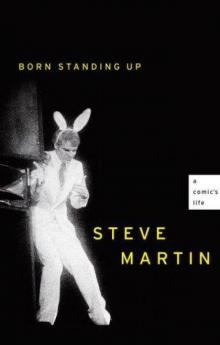 Born Standing Up: A Comic's Life
Born Standing Up: A Comic's Life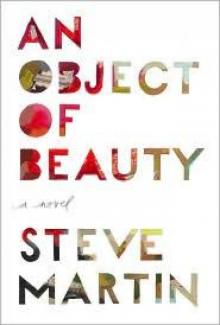 An Object of Beauty
An Object of Beauty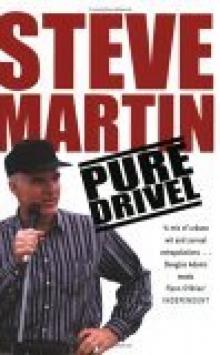 Pure Drivel
Pure Drivel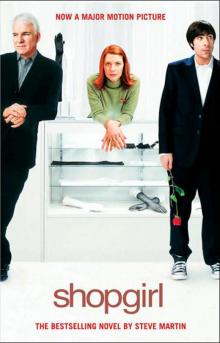 Shopgirl
Shopgirl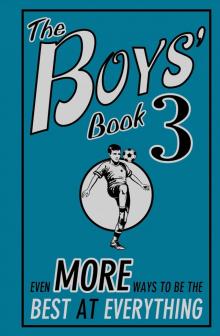 The Boys' Book 3
The Boys' Book 3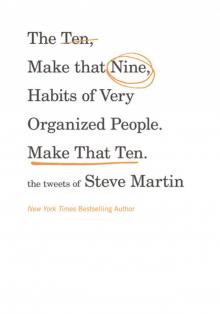 The Ten, Make That Nine, Habits of Very Organized People. Make That Ten.: The Tweets of Steve Martin
The Ten, Make That Nine, Habits of Very Organized People. Make That Ten.: The Tweets of Steve Martin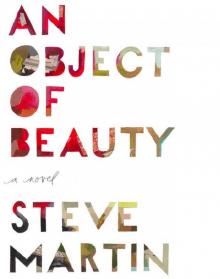 An Object of Beauty: A Novel
An Object of Beauty: A Novel